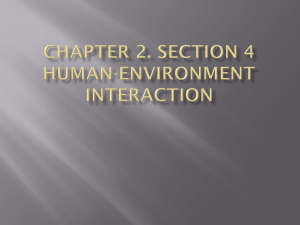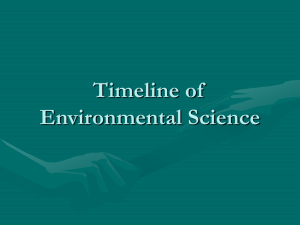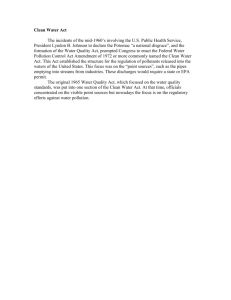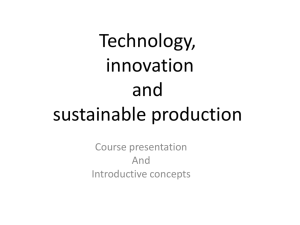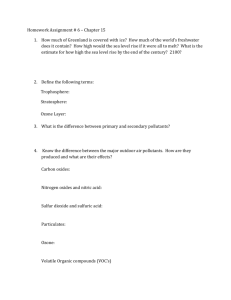The Politics of Protest (Ch. 26)
advertisement
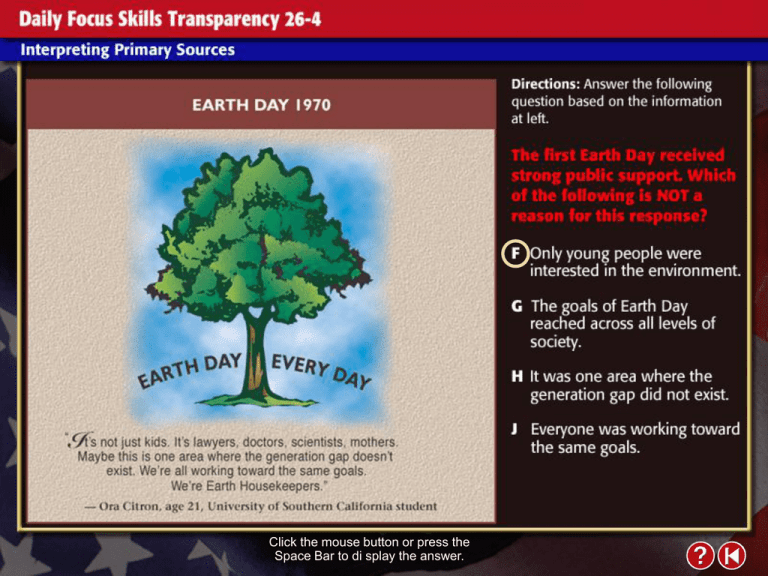
Click the mouse button or press the Space Bar to di splay the answer. TSW: What are the origins of the environmental movement and what are the significant measures taken to combat environmental problems Click the Speaker button to listen to the audio again. 1960’s Environmental Movement Begins • In 1962 Rachel Carson wrote the book Silent Spring • Pesticides like DDT poisoned eagles' foods and weakened eggshells • Americans took warnings to heart and 1/2 million copies of the book were in sold 6 months • The Chemical Industry was outraged by the book • A 1972 ban on DDT led to gradual improvements in population. "Over increasingly large areas of the United States spring now comes unheralded by the return of birds, and the early mornings are strangely silent where once they were filled with the beauty of bird song." (Rachel Carson, Silent Spring) • Wildlife experts believe there may have been 25,000 to as many as 75,000 nesting bald eagles in the lower 48 states when the bird was adopted as our national symbol in 1782 • By the early 1960’s eagles faced extinction with only 450 nesting pairs existing in the U.S. • Laws were enacted to protect the eagles and eliminate the use of DDT. There are now nearly 4,500 adult bald eagle nesting pairs in the U.S. What does it say about a nation when its national bird is endangered? The Movement Blossoms • Smog – fog with smoke and chemicals • Oil Spills – Exxon Valdez • Nuclear Disasters – Three Mile Island – Chernobyl • Pollution – Love Canal and other areas faced serious pollution problems as a result of illegal dumping Smog in Los Angeles Smog in Atlanta Smog in Denver Smog in DFW Exxon Valdez Spill of 1989 • The oil tanker ran aground on a reef in Puget Sound. • 10.9 million gallons of oil were spilled • The accident resulted in the largest oil spill clean-up response ever mobilized. Exxon Valdez Three Mile Island • March 28, 1979 in Harrisburg, Penn. • Reactor at nuclear facility overheated and radiation escaped • Citizens evacuated • Left the public in great doubt about the safety of nuclear power • Since 1973, 60 US facilities shut down and no new facilities have opened. Chernobyl • April 1986 in the Ukraine • Soviet workers were poorly trained • A reactor overheated resulting in a massive explosion that released radiation into the atmosphere • Soviets attempted to cover up the disaster • The area and the people suffer the effects of the disaster still today. Chernobyl How would you like to live next to a nuclear power plant? What about the water? Would you swim? Fish? Drink? Where do you get your water? Love Canal • In the late 1970’s a • Resident Lois Gibbs community in Niagara organized the neighborhood Falls, NY began and demanded the federal noticing increased government address the health problems such as: problems – cancer • local and state officials – miscarriages were not cooperating – birth defects • 1978 entire nation • Residents discovered • That same year 200 families they were living on top were relocated of a toxic waste dump. Love Canal (continued) • In 1980 Pres. Carter declared the area a federal disaster area • 600 remaining families new locations • 1984 sued company that dumped • $20 million awarded • Site was cleaned up Grassroots Effort Begins • • • • Earth Day -1970 Environmental awareness Campaigns against littering Demonstrations against air pollution • Sierra Club • the Audubon Society • the Wilderness Society Government Steps In • Environmental Protection Act was signed in 1970 by President Nixon • set and enforce pollution standards • promotes research • Coordinates antipollution activities Government Steps In • Clean Air Act • 1970 – Nixon tried to Veto • est. emission standards – factories – automobiles Government Steps In • Clean Water Act – 1972 – Nixon attempted to veto this bill also • Endangered Species Act – 1973 • These laws produced a dramatic improvement in some areas Ralph Nader 1965 Unsafe at Any Speed • Charged that automobile manufactures put style, cost, and speed ahead of safety • The auto industry hired P.I.’s to uncover information that would discredit him…and found none • But the incident came to public light and they became much more aware of safety issues Nader’s efforts spurred Congress • National Traffic and Motor Vehicle Safety Act • 1966 • recalls for defects • industry subject to feds • safety standards incorporated into car designs TAKS 1. Air pollution in growing urban areas is most often caused by – • • • • A B C D inefficient home-heating systems fossil-fuel-powered motor vehicles electric-powered light-rail systems nuclear-powered electric generators TAKS • We are prone to speak of the resources of this country as inexhaustible; this is not so. The mineral wealth of this country . . . does not reproduce itself, and therefore is certain to be exhausted ultimately. • —President Theodore Roosevelt in his Seventh Annual Message to Congress, 1907 1. The quote was used to gain support for the creation of the — – – – – A B C D Environmental Protection Agency National Conservation Commission Greenpeace organization Sierra Club TAKS REVIEW • The problems we face are not limited to one coast or one region. From the contaminated waters of Boston Harbor to the pollution of San Francisco Bay; from the closed shellfish beds of the Chesapeake to the growing "dead zone" in the Gulf of Mexico; from the Puget Sound Superfund sites to the PCB-ridden striped bass of New York; coastal pollution is pervasive and growing more deadly with each passing year. — Congressional Record, June 1989 1. Population growth in coastal regions has contributed to the problems described above by -– – – – A creating a need for more highways B causing an increase in flooding and soil erosion C creating a demand for more clean water D producing increasing amounts of sewage and other waste products Student Assessment • http://www.tea.state.tx.us/student.assessmen t/resources/online/2001/eoc/ushistory.html • http://www.tea.state.tx.us/student.assessmen t/resources/online/2002/eoc/ushistory.html The Politics of Protest (Ch. 26) • The Student Movement (Section 1) – Port Huron Statement, Tom Hayden, counterculture • The Feminist Movement (Section 2) – Equal Pay Act, EEOC, Betty Frieden • The Civil Rights Movement (Section 3) – affirmative action, Allan Bakke, busing • Saving the Earth (Section 4)
